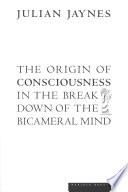Book III, Chapter 3, p. 374
The Origin of Consciousness in the Breakdown of the Bicameral Mind (1976)
Quotes from book
The Origin of Consciousness in the Breakdown of the Bicameral Mind

At the heart of this classic, seminal book is Julian Jaynes's still-controversial thesis that human consciousness did not begin far back in animal evolution but instead is a learned process that came about only three thousand years ago and is still developing. The implications of this revolutionary scientific paradigm extend into virtually every aspect of our psychology, our history and culture, our religion -- and indeed our future.
Book II, Chapter 3, p. 213 ( See also: The Exodus and Minoan eruption)
The Origin of Consciousness in the Breakdown of the Bicameral Mind (1976)
“There is no such thing as a complete consciousness.”
Book II, Chapter 5, p. 281
The Origin of Consciousness in the Breakdown of the Bicameral Mind (1976)
Book II, Chapter 6, p. 299 (See also: John Milton)
The Origin of Consciousness in the Breakdown of the Bicameral Mind (1976)
“We can only know in the nervous system what we have known in behavior first.”
Introduction, p. 18
The Origin of Consciousness in the Breakdown of the Bicameral Mind (1976)
Book II, Chapter 6, p. 302
The Origin of Consciousness in the Breakdown of the Bicameral Mind (1976)
Book III, Chapter 6, p. 445
The Origin of Consciousness in the Breakdown of the Bicameral Mind (1976)
Book I, Chapter 6, p. 132 (Italics as per text...)
The Origin of Consciousness in the Breakdown of the Bicameral Mind (1976)
Book I, Chapter 2, p. 65-66
The Origin of Consciousness in the Breakdown of the Bicameral Mind (1976)
Book III, Chapter 5, p. 405
The Origin of Consciousness in the Breakdown of the Bicameral Mind (1976)
“And in this development lies the origin of civilization.”
Book I, Chapter 6, p. 126
The Origin of Consciousness in the Breakdown of the Bicameral Mind (1976)
Context: The bicameral mind with its controlling gods was evolved as a final stage of the evolution of language. And in this development lies the origin of civilization.
Book III, Chapter 1, p. 318
The Origin of Consciousness in the Breakdown of the Bicameral Mind (1976)
Context: Behavior now must be changed from within the new consciousness rather than from Mosaic laws carving behavior from without. Sin and desire are now within conscious desire and conscious contrition, rather than in the external behaviors of the decalogue and the penances of temple sacrifice and community punishment. The divine kingdom to be regained is psychological not physical. It is metaphorical not literal. It is "within" not in extenso.
“Reading in the third millennium B.C. may therefore have been a matter of hearing the cuneiform,”
Book II, Chapter 2, p. 182
The Origin of Consciousness in the Breakdown of the Bicameral Mind (1976)
Context: Reading in the third millennium B. C. may therefore have been a matter of hearing the cuneiform, that is, hallucinating the speech from looking at its picture symbols, rather than visual reading of syllables in our sense.
Book I, Chapter 2, p. 66
The Origin of Consciousness in the Breakdown of the Bicameral Mind (1976)
Book II, Chapter 5, p. 280
The Origin of Consciousness in the Breakdown of the Bicameral Mind (1976)
Book II, Chapter 3, p. 210 (See also: Karl Polanyi)
The Origin of Consciousness in the Breakdown of the Bicameral Mind (1976)
Context: Such trade was not, however, a true market. There were no prices under the pressures of supply and demand, no buying and selling, and no money. It was trade in the sense of equivalences established by divine decree. There is a complete lack of reference to business profits or loss in any of the cuneiform tablets that have been so far translated.
“Subjective conscious mind is an analog of what is called the real world.”
Book I, Chapter 2, p. 55
The Origin of Consciousness in the Breakdown of the Bicameral Mind (1976)
Context: Subjective conscious mind is an analog of what is called the real world. It is built up with a vocabulary or lexical field whose terms are all metaphors or analogs of behavior in the physical world. Its reality is of the same order as mathematics. It allows us to shortcut behavioral processes and arrive at more adequate decisions. Like mathematics, it is an operator rather than a thing or repository. And it is intimately bound up with volition and decision.
“I shall state my thesis plain. The first poets were gods. Poetry began with the bicameral mind.”
Book III, Chapter 3, p. 361
The Origin of Consciousness in the Breakdown of the Bicameral Mind (1976)
“In a sense, we have become our own gods.”
Book I, Chapter 3, p. 79
The Origin of Consciousness in the Breakdown of the Bicameral Mind (1976)
Context: And when it is suggested that the inward feelings of power or inward monitions or losses of judgement are the germs out of which the divine machinery developed, I return that truth is just the reverse, that the presence of voices which had to be obeyed were the absolute prerequisite to the conscious stage of mind in which it is the self that is responsible and can debate within itself, can order and direct, and that the creation of such a self is the product of culture. In a sense, we have become our own gods.
Book I, Chapter 3, p. 75
The Origin of Consciousness in the Breakdown of the Bicameral Mind (1976)